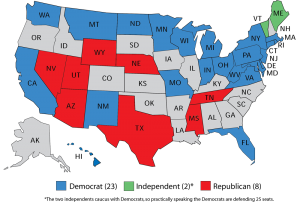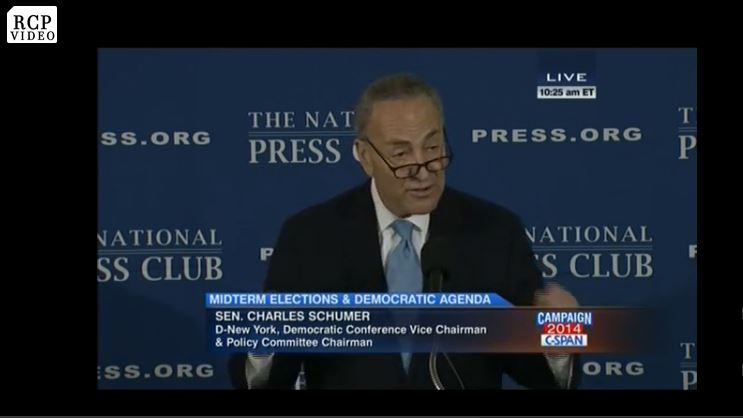Six Months Out to the 2018 Midterm Elections … The 10 Most Vulnerable Senators … 9 Out of 10 are Democrats
TOP 10 SENATOR MOST VULNERABLE IN THE 2018 ELECTIONS … BLUE WAVE? DEMOCRATS LOOK TO LOSE MORE SENATE SEATS.
What do you notice about the Top 10 US Senators listed below who are most vulnerable? None out of ten are Democrats. This election cycle there are an overwhelming number of Democrats up for reelection as opposed to Republicans. Many are in red states that Trump won handily. So before the LEFT starts talking about a blue wave, they have a blue wall to defend. One that came crashing down in 2016.
I agree with the ones on the list; however, I do not agree with the order. The most vulnerable is Sen. Joe Donnelly of Indiana. With Mike Pence as the VP, Indiana becoming a solid red state and Trump having won by 20% in 2016, Donnelly is all but gone. I would have Tester at #2, McCaskill #3, Manchin #4, Heitcamp #5 and something tells me that Ohio is going red as well in 2018. If Manchin does survive and the GOP gets big wins, look for him to maybe switch parties.
With Democrats all but losing their lead in the Generic ballot polls where even CNN, the all fake news, hate trump news all the time has it at just a 3% lead for Dems or the GOP. In December 2017 CNN has it at 56% Dem and 38% Republican. Reuters is down to 1%.
- Dean Heller, NV, Republican
- Claire McCaskill, MO, Democrat
- Joe Donnelly, IN, Democrat
- Heidi Heitkamp, ND, Democrat
- Joe Manchin, WV, Democrat
- Bill Nelson, FL, Democrat
- Jon Tester, MT, Democrat
- Tammy Basldwin, WI, Democrat
- Sherrod Brown, OH, Democrat
- Bob Casey, PA, Democrat
ROLL CALL PICKS THE TOP 10 SENATORS IN MOST TROUBLE IN THE 2018 MIDTERM ELECTIONS.
Nevada Republican Dean Heller remains in top spot.
Senate Democrats are still defending 10 states that President Donald Trump won in 2016, but six months out from Election Day, the most vulnerable senator remains a Republican.
Nevada Sen. Dean Heller no longer faces a primary threat, but he’s the only Republican up for re-election in a state Hillary Clinton won, and in this national environment that’s a tricky place to be.
The Democrats’ odds of flipping a few GOP-held open seats in Arizona and Tennessee have increased over the past six months, but this list — like the one we did a year out from Election Day — ranks incumbents most likely to lose — not seats most likely to flip. That means nine of the 10 senators are Democrats, with the second and third spots remaining unchanged.
North Dakota Sen. Heidi Heitkamp and West Virginia Sen. Joe Manchin III have traded places, with Heitkamp now at fourth and Manchin at fifth. Democrats would have been happy to face Don Blankenship in the West Virginia Senate race, but they’re also not getting Rep. Evan Jenkins, whom they spent nearly $2 million against in the primary.
The biggest change is Florida Sen. Bill Nelson moving up from eighth to sixth with Gov. Rick Scott’s entry into the race. That pushes Montana Sen. Jon Tester and Ohio Sen. Sherrod Brown down a spot each to seventh and eighth, respectively.
Posted May 11, 2018 by Scared Monkeys 2018 Elections, Ben Nelson (D-NE), Joe Manchin (D-WV), Senate, Senate Elections | one comment |
Seven Senate Seats Most likely to Flip in 2018 … I Believe There is Even More, This One Goes to 11
DEMOCRATS HAVE A TOUGH BATTLE IN THE SENATE IN 2018 … ITS A NUMBERS GAME.
As reported from The Hill, there are 7 US Senate seats that are likely to flip in the 2018 elections. However, they may not exactly flip the way the media thinks they will. Just from the mere numbers that both parties have to defend, the GOP has an advantage. Republicans, who will only defend eight seats, two of which are considered vulnerable. By comparison, Democrats have to defend 25 seats, including 10 in states that Trump won in 2016. Many of the states Trump won wide huge margins. The MSM is so quick to reference President Trump’s “dismal” approval rating. However, you know who has an even worse approval rating by far? Congress does. One would think that Democrats from Montana, Indiana, North Dakota and Missouri are all but gone. Why these “RED” states have Democrat Senators is puzzling at best.President Trump needs to vigorously campaign for these GOP candidates and preferably hand pick ones that are not Rino’s, but actual Republicans and preferably Conservatives.
The one GOP seat that will most likely flip is Heller in Nevada. The state has been trending blue for years. However, I disagree with Sen. Flake of Arizona. One of two things will happen. Either Fake will be primary challenged by a candidate backed by Trump and win or Flake will get his act in gear. My personal opinion is he must go. Others that need to be added to the list of flipping is Democrat Sens. Sherrod Brown of Ohio, Tammy Baldwin of Wisconsin, Robert Casey of Pennsylvania and Debbie Stabenow of Michigan. All are obstructionist Democrat senators from states won by Trump in 2016. The GOP has an opportunity of a lifetime in 2018, the questions is, will Senate Majority Leader Mitch McConnell blow it.?
Next year’s midterm elections will provide Republicans with a major opportunity to build their majority in the Senate — if they can overcome President Trump’s dismal approval ratings and internal party rancor.
The 2018 Senate map heavily favors Republicans, who will only defend eight seats, just two of which are considered vulnerable right now. By comparison, Democrats have to defend 25 seats, including 10 in states that Trump won in 2016.
1. Dean Heller (R-Nev.)
Heller is the only Republican up for reelection in 2018 who represents a state that Hillary Clinton won last November. Making matters worse for Heller, he’s had a rough 2017.
Democrats are largely falling in line behind Rep. Jacky Rosen (D-Nev.), a strong challenger with backing from former Senate Majority Leader Harry Reid, the dean of Nevada Democrats. Rep. Dina Titus (D-Nev.) is still weighing a bid, but Democrats’ near-uniform support for Rosen could squeeze Titus out of the race and give the party more time to focus on Heller.
2. Sen. Claire McCaskill (D-Mo.)
McCaskill is one of the few statewide Democratic officeholders left in Missouri, which Trump won by 19 points in November.
The two-term senator spent 2016 as one of Hillary Clinton’s top surrogates, mounting a strong defense of the Democratic presidential nominee that McCaskill’s rivals believe will become a weakness in her own campaign.
McCaskill’s party also just lost Missouri’s 2016 Senate race, despite a strong campaign from Democrat Jason Kander.
3. Sen. Joe Donnelly (D-Ind.)
Donnelly leveraged a bipartisan approach to politics and his blue-collar appeal into a Senate seat in 2012, but he’ll have to fight yet another tough battle if he wants to keep his Senate seat in a state Trump won by 19 points.
4. Sen. Jeff Flake (R-Ariz.)
Flake wouldn’t rank this high in a normal election year, but a Republican president threatening to support a primary challenge to an incumbent GOP senator isn’t normal, either.
The Arizona senator’s path to reelection has grown more difficult as his feud with Trump heats up. Earlier in August, Trump called Flake “toxic” in a tweet where he applauded Kelli Ward, Flake’s primary opponent. And the president’s upcoming Tuesday rally in Arizona could give him a stage to take more shots at Flake or even officially endorse a primary opponent.
5. Sen. Joe Manchin (D-W.Va.)
In 2016, West Virginia went for Trump by a larger margin than any other state — 42 points.
That resounding victory hasn’t been lost on Manchin, who’s made it a point to try to work with the president and Senate GOP colleagues. Another factor counting in his favor: Manchin’s consistent record of winning statewide office in the West Virginia since 2001, despite the state’s rightward drift.
But Trump’s popularity in West Virginia has drawn interest from strong Republican candidates, and the winner will pose a serious threat to Manchin’s political future. And Democrats can’t be encouraged by Gov. Jim Justice’s decision to ditch them and become a Republican last month, a decision he announced with Trump at his side.
6. Sen. Heidi Heitkamp (D-N.D.)
Heitkamp hails from another deep-red state — North Dakota went for Trump by about 36 points.
Like Manchin, Heitkamp has walked the line between the party’s opposition to Trump and his popularity among her constituents — briefly floated as a potential Agriculture Secretary, Heitkamp, like Manchin, voted for more than two-thirds of Trump’s Cabinet appointments.
7. Sen. Jon Tester (D-Mont.)
Republicans have a lot to like about their Montana prospects. Trump won the state by more than 20 points in November, and Republican Greg Gianforte just won the state’s at-large congressional seat in a special election — even after he assaulted a reporter.
Tester has never hit 50 percent in either of his two Senate bids, winning each election with 49 percent after a libertarian candidate siphoned off part of the vote.
Posted August 24, 2017 by Scared Monkeys 2018 Elections, Ben Nelson (D-NE), Joe Manchin (D-WV), Mitch McConnell (R-KY), Senate, Senate Elections | one comment |
Sen. Chuck Schumer (D-NY) Says Dems Screwed Up Passing Obamacare … “Democrats Blew the Opportunity the American People Gave Them” in 2008 and “Put All of Our Focus on the Wrong Problem”
ISN’T THIS INTERESTING, DEMOCRAT CHUCKY SCHUMER SAYS THAT DEMOCRATS SCREWED UP PASSING OBAMACARE …
Speaking Tuesday at the National Press Club in Washington, DC, New York Democrat Sen. Charles Schumer had an epiphany and stated that “Democrats blew the opportunity the American people gave them” after the 2008 election. Schumer went on to say that, “We took their mandate and put all of our focus on the wrong problem, health care reform.” Gee, ya think? Sen. Schumer was one of the 60 Democrat senators who passed Obamacare, with not one GOP vote, and forced the unpopular law down the throats of Americans. Now suddenly because as we predicted back then, it would be their undoing, Schumer has misgivings that Democrats focused on it first and did not focus on what Americans were dealing with on a day to day basis, a poor economy and unemployment. Schumer told those in attendance “that considering 85% of all Americans got their health care from either the government, Medicare, Medicaid, or their employer … we would still only be talking about only 5% of the electorate.” Wasn’t that the same argument that those opposed to Obamacare were making in 2009? Why blow up the healthcare system in the United States for only 5% of the people? This is a kin to demolishing a house because the back porch needs repair. Not only did Democrats not listen to the people, the law they forced upon them was nothing more than a lie.
Democrats made a strategic mistake by passing the Affordable Care Act, Sen. Charles Schumer (N.Y.), the third-ranking member of the Senate Democratic leadership, said Tuesday.
Schumer says Democrats “blew the opportunity the American people gave them” in the 2008 elections, a Democratic landslide, by focusing on healthcare reform instead of legislation to boost the middle class.
But why is Sen. Schumer talking about the Democrats disastrous decision to pass Obamacare now, is it because they have buyer’s remorse and care about the American people? Not at all, it is because they have taken a political shellacking in 2010 and 2014 and now find themselves in the minority in the House and the Senate. It all has to do with power, not the people. Honestly, who in their right mind thought that an unpopular bill that adversely affected so many people to only benefit a few would not have ramifications? If Democrats could not see that, then they deserve what they got.
click HERE or on PIC to WATCH VIDEO from RCP
Transcript from Real Clear Politics:
SEN. CHUCK SCHUMER (D-NY): After passing the stimulus, Democrats should have continued to propose middle-class oriented programs and built on the partial success of the stimulus. But unfortunately, Democrats blew the opportunity the American people gave them. We took their mandate and put all of our focus on the wrong problem — health care reform. Now the plight of uninsured Americans and the hardships caused by unfair insurance company practices certainly needed to be addressed, but it was not the change we were hired to make. Americans were crying out for the end to the recession, for better wages and more jobs, not changes in health care.
This makes sense, considering 85% of all Americans got their health care from either the government, Medicare, Medicaid, or their employer. And if health care costs were going up, it really did not affect them. The Affordable Care Act was aimed at the 36 million Americans who were not covered. It has been reported that only a third of the uninsured are even registered to vote. In 2010 only about 40% of those registered voting. So even if the uninsured kept with the rate, which they likely did not, we would still only be talking about only 5% of the electorate.
To aim a huge change in mandate at such a small percentage of the electorate made no political sense. So when Democrats focused on health care, the average middle-class person thought the Democrats are not paying enough attention to me. Again, our health care system was riddled with unfairness and inefficiency. It was a problem desperately in need of fixing. The changes that were made are and will continue to be positive changes, but we would have been better able to address it if Democrats had first proposed and passed bold programs aimed at a broader swath of the middle class.
Had we started more broadly, the middle class would have been more receptive to the idea that President Obama wanted to help them. The initial faith they placed in him would have been rewarded. They would have held a more pro-government view and would have given him the permission structure to build a more pro-government coalition. Then Democrats would have been in a better position to tackle our nation’s healthcare crisis.
Healthcare, it wasn’t at the top of the agenda for middle class people …
“We should have done it, we just should not have done it first”. People were hurting and said, what about me, I am losing my job. It’s not health care that is bothering me.”
EXIT QUESTION: So why is Sen. Charles Schumer making these comments about Obamacare? Maybe because Schumer does not want to be the next on the list of 29 Democrat Senators who are no longer in the US Senate who voted for Obamacare.
US Senate Races 2012 … GOP Poised to Take Back the Senate, Up in FL, WI, MT, NE and MA
Every one has their eye on the GOP Presidential primary and which Republican hopeful, Romney, Santorum, Gingrich, Paul, or a player to be named later will run against Barack Obama in the 2012 election. However, do not forget the all important US Senate elections. The GOP is poised to take back control from Harry Reid and the Democrats in 2012.
Republicans nearly took back control of the Senate in the 2012 midterm elections; however, because of the mere number of seats that Democrats will have to defend and the number of retirements, it is hard to imagine that Harry Reid will be Senate Majority Leader following the 2012 elections. Republicans look poised to pick up seats in Florida, Wisconsin, Montana, Nebraska and holding Massachusetts.
Election 2012: Florida Senate – Florida Senate: Mack (R) 43%, Nelson (D) 36%. Incumbent Bill Nelson finds himself in serious trouble in the battleground state of Florida. This would be a huge pick up for the GOP. Look for Senator Marco Rubio (FL-R) to be the difference for Mack.
Republican Congressman Connie Mack now posts a seven-point lead over Democratic Senator Bill Nelson in Florida’s U.S. Senate race, and the incumbent remains just ahead of his other two potential GOP rivals.
Election 2012: Nebraska Senate – Nebraska Senate: Bruning (R) 55%, Kerrey (D) 33%. Nebraska is all but lost to Democrats as Ben “the Corn Husker Kickback” Nelson is getting out of Dodge in lie of being on the wrong side of a landslide GOP victory in 2012.
Democrats hoped to give themselves a shot at holding onto a U.S. Senate seat in Nebraska by talking retired Senator Bob Kerrey into running, but the first Rasmussen Reports survey of the race finds Kerrey trailing all three of his leading Republican opponents. A new telephone survey of Likely Nebraska Voters finds state Attorney General Jon Bruning earning 55% support to Kerrey’s 33%. Four percent (4%) like another candidate in the race, and seven percent (7%) remain undecided. (To see survey question wording, click here.)
Election 2012: Wisconsin Senate – Wisconsin Senate: Thompson (R) 50%, Baldwin (D) 36%.
Former Governor Tommy Thompson continues to be the strongest Republican contender for Wisconsin’s open U.S. Senate seat, now posting a double-digit lead over Democratic Congresswoman Tammy Baldwin.
The latest Rasmussen Reports telephone survey of Likely Voters in Wisconsin shows Thompson with 50% support to Baldwin’s 36%. Four percent (4%) like some other candidate, and 10% are undecided. (To see survey question wording, click here.)
Election 2012: Montana Senate – Montana Senate: Rehberg (R) 47%, Tester (D) 44%. Incumbent Democrat Jon Tester finds himself below the 50% threshold and in trouble for reelection in 2012.
Democratic incumbent Jon Tester runs slightly behind his leading Republican challenger in his bid for reelection in Montana’s U.S. Senate race.
A new telephone survey of Likely Voters in the state finds Republican Congressman Denny Rehberg earning 47% support to Tester’s 44% in Rasmussen Reports’ first look at this contest. Four percent (4%) prefers some other candidate, while five percent (5%) are undecided. (To see survey question wording, click here.)
Election 2012: Massachusetts Senate – Massachusetts Senate: Brown (R) 49%, Warren (D) 44%.
Massachusetts Senator Scott Brown, who won the 2010 special election to finish the term of the late Ted Kennedy, holds a modest lead over his expected Democrat challenger Elizabeth Warren in the first Rasmussen Reports’ look at his 2012 reelection bid in the Bay State.
More to follow …
Posted March 15, 2012 by Scared Monkeys 2012 Elections, Ben Nelson (D-NE), Harry Reid (D-NV), Polls, Rasmussen, Senate, Senate Elections | 3 comments |
Another Dem Bites the Dust Due to Obamacare … Nebraska Democrat US Senator Ben Nelson Retiring … Abandons the Sinking Democrats Senate Ship
CORN HUSKER KICKBACK AS PREDICTED COMES BACK TO HAUNT BEN NELSON …
According to the Politico, Democratic Senator Ben Nelson of Nebraska will announce today that he is retiring after two terms. Does this really come as a shock to any one? Ben Nelson, who went against the will of the Nebraska voters and took the “Corn Husker” kick back and then voted in favor of Obamacare was a “politically” dead man walking. The rats are leaving the sinking ship. They followed Obama against the will of the people and now those that did not pay the price in the 2012 election will do so in 2012.
Democratic Sen. Ben Nelson of Nebraska will announce today that he is retiring after two terms, a serious blow to Democratic efforts to hold onto their majority in the chamber next November.
Nelson is scheduled to hold a press conference back home in Nebraska as early as today to make his decision official, said several Democratic insiders close to the leadership.
The 70-year-old Nelson was considered one of the most endangered Democratic incumbents this cycle. GOP-affiliated outside groups have already dumped hundreds of thousands of dollars into TV ads bashing Nelson, while the Democratic Senatorial Campaign Committee spent over $1 million on their own ad blitz to bolster his image.
Obviously Nelson read the hand writing on the wall and did not want to go out with a loss. Instead, Harry Reid will.
After committing political suicide and voting for Obamacare, Nelson then tried to save face with the “RED” state of Nebraska and told fellow Cornhuskers that, “I think it was a mistake to take health care on as opposed to continuing to spend the time on the economy”. Ben Nelson has no one to blame but himself and President Barack Obama for his early retirement. There is no doubt that Democrats are in trouble in 2012 holding on to the US Senate. whether Ben Nelson was running for reelection or not, there was no way that Democrats were going to win in the Corn husker state.
Chalk up another casualty to Barack Obama and Obamacare. Democrats actually thought that WE THE PEOPLE would forget what they did. Hardly. Presently, 53% want Obamacare repealed, 39% oppose repealing it.
Democrats have a slim advantage in the US Senate; however, it will be almost impossible for them to retain power following the 2012 elections. They could have easily lost control in 2010 had it not been for a couple of Senate races and incumbent GOP Senators resisting the wave of change. Democrats are far too vulnerable to regain control.
Other vulnerable Democrats like Sen. Claire McCaskill (Mo.) and Jon Tester (Mont.) also face difficult – although winnable – reelection fights.
There will also be costly races in Ohio, Florida and Pennsylvania, featuring Democratic incumbents Sherrod Brown, Bill Nelson and Bob Casey. President Barack Obama’s reelection campaign is expected to spend heavily in those states, potentially giving a boost to Democratic incumbents.
What did not occur in 2010, the GOP looked good in 2012 to regain control. Democrats have to defend far too many seats, many of which are in “RED” states or ones trending red. Between Democrat retirements and a backlash against Obama and his policies, it would take a miracle for Harry Reid to remain Senate Majority Leader. A miracle or voter fraud.
The WAPO has a list of potential GOP and Democrats who might run for the open seat.
Posted December 27, 2011 by Scared Monkeys 2012 Elections, Barack Obama, Ben Nelson (D-NE), Obamacare, Obamanation, Senate, Senate Elections | 5 comments |

 RSS
RSS












